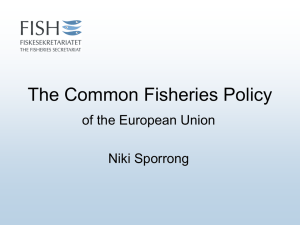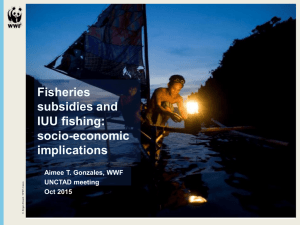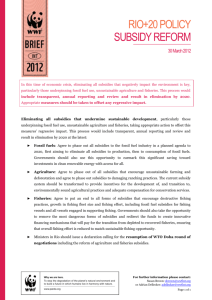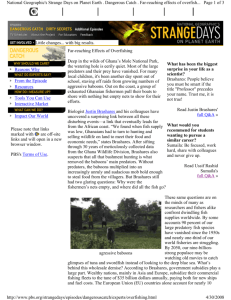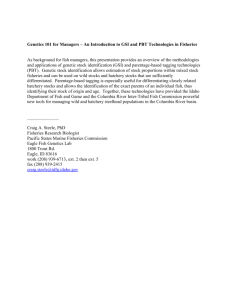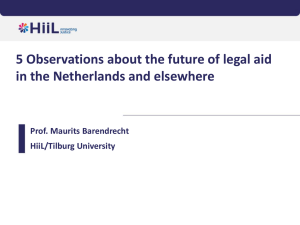Mr. Rashid Sumaila A H E
advertisement
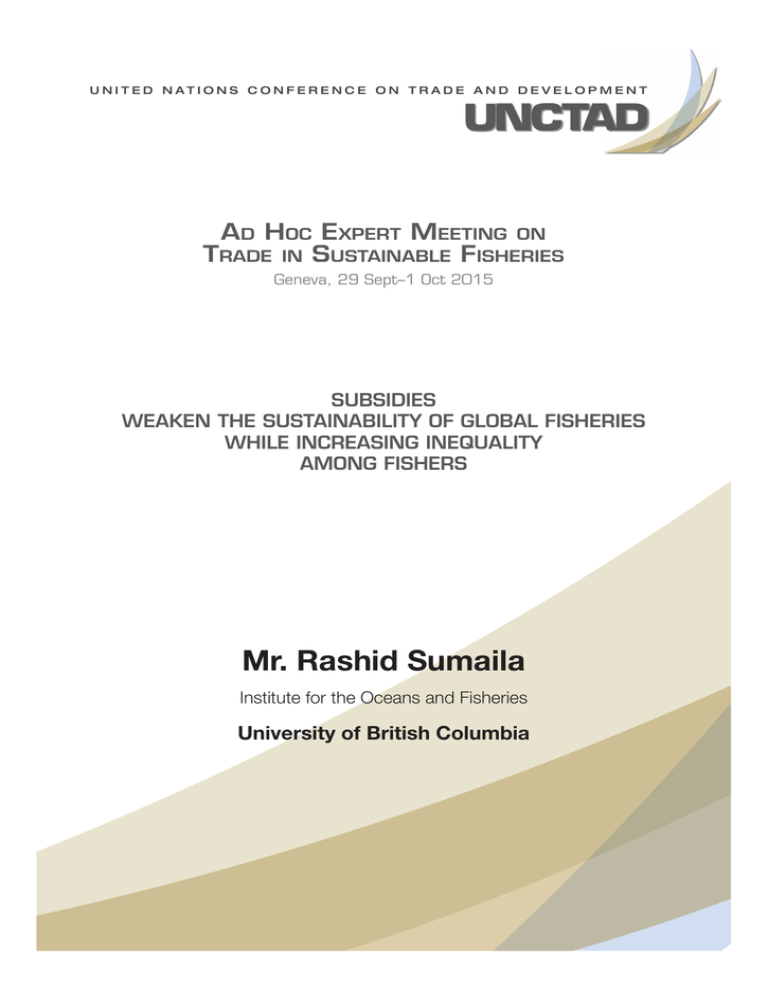
U n i t e d N at i o n s C o n f e r e n c e o n T r a d e A n d D e v e l o p m e n t Ad Hoc Expert Meeting on Trade in Sustainable Fisheries Geneva, 29 Sept–1 Oct 2015 Subsidies Weaken the Sustainability of Global Fisheries while Increasing Inequality among Fishers Mr. Rashid Sumaila Institute for the Oceans and Fisheries University of British Columbia SUBSIDIES WEAKEN THE SUSTAINABILITY OF GLOBAL FISHERIES WHILE INCREASING INEQUALITY AMONG FISHERS U. Rashid Sumaila Fisheries Economics Research Unit & Global Fisheries Cluster Institute for the Oceans and Fisheries, the University of British Columbia 2202 Main Mall, Vancouver, BC, V6T 1Z4, Canada r.sumaila@fisheries.ubc.ca Abstract First, this note provides a summary of the importance of fisheries to people and argues that our interactions with fisheries are currently unsustainable. Next, it identifies the provision of capacity-enhancing subsidies as one of the key policy failures that have intensified the degradation of marine fisheries while also increasing inequality among fishers. The paper then provides reasons why all fishing nations (developing, developed, small and large) need to discipline their capacity-enhancing subsidies. Finally, the note provides suggestions on how to make progress in disciplining subsidies. How important are fisheries to people? Ocean and coastal biomes provide us with food, fuel and biological resources, climate regulation and biogeochemical processes (e.g. CO2 uptake and carbon storage), and cultural services (e.g. recreational, spiritual and aesthetic enjoyment) while supporting other indirect ecosystem services such as nutrient cycling (Gattuso et al. 2015). In particular, fish support human well-being by contributing to (i) food and nutritional security for the poor and rich alike (Srinivasan et al. 2010); (ii) social security by supporting millions of jobs and serving as an employer of last resort in many fishing communities around the world (Béné et al. 2010, Teh et al. 2011, FAO 2014); (iii) economic security by generating incomes for both people and fishing enterprises (World Bank 2009, Sumaila et al. 2012, FAO 2014). Challenges facing ocean fisheries worldwide Achieving sustainable fisheries has proved difficult since after the Second World War, as they suffer from the tragedy of the commons resulting in overfishing, pollution, and habitat destruction (Pauly et al. 2002). Global warming, ocean acidification and deoxygenation are new threats (Gattuso et al. 2015). Combined with the long-standing threats, these new issues are creating formidable challenges to this important source of ecosystem services, especially, with 1 respect to the ability of future generations to enjoy these services too (Sumaila and Walters 2005, Ekeland et al. 2015). Fishing effort targeting wild fish stocks increased rapidly following World War II, particularly off the coasts of Europe, North America, and Japan. The spatial coverage of global fishing effort also expanded rapidly to cover most of the world’s oceans by 2005 (Swartz et al. 2010), with an increase in overall fish catches continuing until 1996 when they peaked at about 86 million tonnes. The expansion of the geographic extent of fishing has been accompanied by a ten-fold increase in global fishing effort since 1950 (Figure 1); a figure that rises to 25-fold for Asia over the same period. Overall, the decline in global catch per unit effort suggests a decrease in the biomass of many fished populations, likely by over 50 percent (Watson et al. 2013). The reasons for this large increase in fishing effort are many, with ineffective management, technological innovation and the provision of subsidies chief among them. The expansion of capacity has been such that the World Bank and FAO (2009) estimated that the total global catch could be achieved with only half of the effort actually employed. Figure 1: Global Trends in Fisheries Catch and Fishing Effort (1950-2006). Source: Watson et al. (2013) The observed increase in fishing effort and catch has impacted wild fish stocks and their habitats negatively (Pauly et al. 2002). These impacts have significantly affected marine ecosystems and the fish stocks they contain (Halpern et al. 2012). This in turn threatens our food and nutritional security as well as social and economic securities. Fisheries subsidies There are various definitions of fisheries subsidies in the literature. A simple and clear definition is provided by the World Bank: A subsidy is a “financial contribution [direct or indirect] from the public sector that grants private benefits to the fishery sector”. 2 It should be noted that the economic justification for imposing taxes or providing subsidies to an economic sector stems from the existence of externality, which occurs when producing or consuming a good causes an impact on third parties not directly related to the transaction. Positive externalities have a positive impact while negative externalities impact third parties negatively. Hence, to achieve maximum benefits for society, subsidies are provided in the case of positive externalities (e.g. subsidising the education of citizens), and taxes are imposed in the case of negative externalities (e.g. taxes on cigarettes). Since the provision of capacity-enhancing or harmful subsidies results in overfishing of fish stocks, it makes no economic sense. The above paragraph implies that different kinds of subsidies would have different effects on the fish stocks targeted by the subsidized industry (Milazzo 1998) and Sumaila et al. (2013) identify three different types of subsidies according to the impact they tend to have on fisheries resources: (i) subsidies for management, research, etc., sometimes defined as good subsidies because they are generally assumed to have a positive effect on our ability to sustainably manage fishery resources; (ii) capacity-enhancing (or harmful) subsidies, including those for boat construction and fuel, tend to promote disinvestment in the resource by motivating overcapacity and overfishing; and (iii) ambiguous subsidies, including those to vessel buy-back programmes and rural fisher community development, can promote or undermine the sustainability of the fish stock depending on the circumstances. There are at least three interconnected reasons why subsidies should be disciplined. First, total fisheries subsidies were recently estimated at about US$35 billion a year (Sumaila et al. 2013), which is significant since it constitutes between 30 to 40% of the landed values generated by wild fisheries worldwide. Of these, capacity-enhancing subsidies make up the highest share, at around US$20 billion worth of transfers to fishing fleets in 2009 (Figure 2). Figure 2: Estimate of global fisheries subsidies. Capacity-enhancing subsidies 83% of total USD 35 billion. Subsidies to developed country fisheries at 65% of total. Source: Sumaila et al. (2013). 3 Figure 3 shows that fuel subsidies make up the greatest proportion (22% of the total), followed by subsidies for management at 20% and ports and harbours at 10%. Subsidies contributed by developed countries (65% of the total) are far greater than that contributed by developing countries, a group that lands about 80% of global fish catch. Figure 3: Subsidies by Type and by Developed and Developing Country (2009). Source: Sumaila et al. (2013). Second, subsidies have socio-economic, distributional and trade impacts because they can distort the market for fish and disadvantage fishers who receive relatively less subsidies. For example, as depicted in Figure 4 below, most of the subsidies go to the large-scale industrial fishers in developed countries, thereby disadvantaging small-scale developing country fishers, who are relatively more resource poor, by distorting the market for fish. This is a barrier to development where it is most needed. 4 300 Subsidy per fishery 250 Developing countries 200 Developed 150 100 50 Beneficial Capacity enhancing Ambiguous Figure 4: Subsidy type per fisher in developing versus developed countries. Data source for subsidies: Sumaila et al. (2013) and for jobs: Teh and Sumaila (2011). Third, it has theoretically been established that some fisheries subsidies (the capacity-enhancing ones) are detrimental to the sustainability of fisheries because they stimulate overcapacity and overfishing (Clark et al. 2005), and empirical evidence of these effects are beginning to appear in the literature (e.g. Heymans et al. 2011). One can argue that the provision of capacity enhancing subsidies is one of the reasons why we see in Figure 1 that fishing effort keeps on increasing while the catch remains flat or even decreasing, and global fisheries as a whole are currently running at a loss after their profits are adjusted for fisheries subsidies (Sumaila et al. 2012). It should be noted that although the direct impact of subsidies on a fish stocks depends on the health of the fish stock and the strength of management in place, fisheries management is very rarely completely effective, and there is also evidence that subsidies can undermine efforts to manage stocks sustainably. This implies that even with good fisheries management, subsidies can be harmful (Munro and Sumaila 2002). It is therefore important that capacity-enhancing subsidies be eliminated even in fisheries where management is reasonably effective. Ways to discipline capacity-enhancing subsidies To make real progress in disciplining capacity-enhancing subsidies, it is important to develop and implement a multi-scale multi-stakeholder approach. Effort should be exerted at the national, regional and global levels of governance. An example of a recent national effort to discipline capacity-enhancing subsidies is Indonesia. This is a large developing country with globally significant fisheries, and a country that provides 5 US $ in million (2009) a substantial amount of subsidies (Figure 5). The key motivation for providing subsidies to the fishing sector, for many countries, is social, including the desire to help small-scale poor fishers. But as can be seen in Figure 5, over 95% of the capacity-enhancing subsidies go to the large scale sector in Indonesia. For Mexico only USD 22 million of the over USD 200 million subsidy is estimated to go to the small scale sector. Preliminary work (Schuhbauer and Sumaila, in prep) indicate that this results are similar for other countries. Fortunately, for Indonesia, the current government is working on reducing its capacity-enhancing subsidies. Other key fishing nations could follow the example of Indonesia. 3% 250 200 15% Smallscale 150 100 100% 50 0 Beneficial Capacity enhancing Ambiguous Figure 5: Indonesian fisheries subsidies by small-scale and large-scale sectors. A large percentage of the country’s subsidies to the large-scale sector. Source: Schuhbauer and Sumaila (in prep.). I present below four suggestions based on the work of the E15Initiative Expert Group on Oceans, Fisheries and the Trade System convened by the International Centre for Trade and Sustainable Development and the World Economic Forum (Sumaila 2016). These suggestions are at the regional and global levels. Core group of countries adopts fisheries subsidies disciplines. A good example here is the effort of the countries of the TPP, which if successful can make a contribution to reducing the provision of capacity-enhancing subsidies. It should be noted that even if a ‘good’ TPP agreement is achieved, a key gap is that the TPP disciplines will not cover several large subsidisers (EU, China, and Russia). Still, the TPP outcome could serve as a stepping stone towards multilateral disciplines built on the work of a ‘core group’ of large subsidisers. Other groups of countries that could make a move here are the Africa Caribbean and Pacific (ACP) countries and the countries of Benguela Current Commission – Angola, Namibia and South Africa. 6 Establish multilateral disciplines built step-wise and ‘bottom up’. A group of countries, perhaps in partnership with Intergovernmental Organisations, could stimulate collective action with bottom-up voluntary commitments to subsidy reform. Through a process similar to the approach taken in climate change negotiations, each country would declare the amount of capacityenhancing subsidies that they would voluntarily eliminate within a given time period. This kind of initiative can in and of itself stimulate other countries to follow the example of this group. To effectively close the “ambition gap” between the voluntary offers and the necessary level of global reductions, this approach would require either multilateral participation, or at least the participation of the world’s largest providers of fisheries subsidies. NGOs and other civil society groups could help speed up the uptake of this example by encouraging and prodding countries. Establish multilateral disciplines built on areas of agreement in WTO negotiations As identified in the WTO Rules Negotiating Group Chair’s 2011 report on the negotiations, areas of relatively more agreement, included disciplining subsidies to IUU vessels, transfer of vessels and access agreements; there was arguably a level of agreement, at least in principle, with the idea of reforming construction subsidies and those that affected overfished stocks. Proposals for a small package of subsidy disciplines tabled early in 2015 in the context of the WTO negotiations, including by the ACP group of countries, and a proposal by Argentina, Iceland, New Zealand, Norway, Peru, and Uruguay, suggest that there is still interest in achieving multilateral disciplines. Both proposals include a core list of prohibited subsidies, such as those benefitting IUU fishing and those affecting overfished stocks. Align incentives by focusing international subsidy negotiations on international fish stocks. A key reason for the lack of progress in protracted subsidies negotiations at the WTO is that the negotiations suffer from what has been described as the “lumpiness” problem (Sumaila 2013). This refers to the requirement that WTO negotiators should aim for an all-inclusive deal or no deal at all. This requirement has limited the ability of the fisheries subsidies negotiations to make progress by confounding the subsidies issue with other problems. One way to overcome this difficulty is to align subsidies policies with national interests by splitting the world's fisheries into domestic fisheries (i.e. those operating within a country's exclusive economic zone (EEZ) targeting fish stocks that spend all their lives within the EEZ) and international fisheries (i.e. fish stocks that are transboundary, highly migratory or discrete high seas stocks). International negotiations could then prioritize agreement to reform subsidies that affect international fish stocks, and governments would work unilaterally to reform subsidies that affect only their domestic fisheries. Concluding remarks I have discussed the importance of fisheries to people and argued that our interactions with fisheries, in most cases, are currently unsustainable. I also made the case that the provision of capacity-enhancing subsidies is a policy failure and economically counter-productive because they produce negative externalities. A key point stressed in this note is the fact that capacityenhancing subsidies do not only undermine the marine ecosystems and fish stocks; they also aggravate inequality among fishers. I also highlighted reasons why all fishing nations (developing, developed, small and large) should strive to discipline capacity-enhancing 7 subsidies. Finally, I argue for approaches at national, regional and global levels that involve all stakeholders as a way to galvanize worldwide action to discipline subsidies. References Béné, C., Hersoug, B., Allison, E.H. Not by Rent Alone: Analysing the Pro-Poor Functions of Small-Scale Fisheries in Developing Countries. Development Policy Review 28, 325–358. doi:10.1111/j.1467-7679.2010.00486.x (2010). Clark, Colin W., Gordon R. Munro, and Ussif Rashid Sumaila. "Subsidies, buybacks, and sustainable fisheries." Journal of Environmental Economics and Management 50, no. 1 (2005): 47-58. FAO (Food and Agriculture Organization of the United Nations). "The state of world fisheries and aquaculture." (2014). Gattuso, J.-P., Magnan, A., Billé, R., Cheung, W. W. L., Howes, E. L., Joos, F., Allemand, D., Bopp, L., Cooley, S., Eakin, C.M., Hoegh-Guldberg, O., Kelly, R.P. et al. Contrasting futures for ocean and society from different CO2 emissions scenarios. Science (2015), 349 no. 6243 DOI: 10.1126/science.aac4722. Halpern, Benjamin S., Catherine Longo, Darren Hardy, Karen L. McLeod, Jameal F. Samhouri, Steven K. Katona, Kristin Kleisner et al. "An index to assess the health and benefits of the global ocean." Nature 488, no. 7413 (2012): 615-620. Heymans, Johanna Jacomina, Steven Mackinson, Ussif Rashid Sumaila, Andrew Dyck, and Alyson Little. "The impact of subsidies on the ecological sustainability and future profits from North Sea fisheries." PLoS One 6, no. 5 (2011): e20239. Milazzo, Matteo. Subsidies in world fisheries: a reexamination. Vol. 23. World Bank Publications (1998). Munro, Gordon, and Ussif R. Sumaila. "The impact of subsidies upon fisheries management and sustainability: the case of the North Atlantic." Fish and fisheries 3, no. 4 (2002): 233-250. Pauly, Daniel, Villy Christensen, Sylvie Guénette, Tony J. Pitcher, U. Rashid Sumaila, Carl J. Walters, Reg Watson, and Dirk Zeller. "Towards sustainability in world fisheries." Nature 418, no. 6898 (2002): 689-695. Schuhbauer, Anna and Sumaila, U. Rashid. “Global analysis of the provision of fisheries subsidies to small-scale versus large-scale fisheries” (in prep.). Sumaila, Rashid U. Trade Policy Options for Sustainable Oceans and Fisheries. E15 Expert Group on Oceans, Fisheries and the Trade System Policy Options Paper. E15Initiative. Geneva: 8 International Centre for Trade and Sustainable Development (ICTSD) and World Economic Forum (2016). Sumaila, Ussif R., and Carl Walters. "Intergenerational discounting: a new intuitive approach." Ecological Economics 52, no. 2 (2005): 135-142. Sumaila, U. Rashid. "How to make progress in disciplining overfishing subsidies." ICES Journal of Marine Science: Journal du Conseil 70, no. 2 (2013): 251-258. Sumaila, Ussif Rashid, William Cheung, Andrew Dyck, Kamal Gueye, Ling Huang, Vicky Lam, Daniel Pauly et al. "Benefits of rebuilding global marine fisheries outweigh costs." PloS one 7, no. 7 (2012): e40542. Sumaila, U. R., Lam, V., Le Manach, F., Swartz, W., and Pauly, D. “Global Fisheries Subsidies.” European Parliament, http://www.europarl.europa.eu/RegData/etudes/note/join/2013/513978/IPOLPECH_NT(2013)513978_EN.pdf. (2013). Swartz, Wilf, Enric Sala, Sean Tracey, Reg Watson, and Daniel Pauly. "The spatial expansion and ecological footprint of fisheries (1950 to present)." PloS one 5, no. 12 (2010): e15143. Teh, Lydia CL, and Ussif Rashid Sumaila. "Contribution of marine fisheries to worldwide employment." Fish and Fisheries 14, no. 1 (2013): 77-88. Watson, Reg A., William WL Cheung, Jonathan A. Anticamara, Rashid U. Sumaila, Dirk Zeller, and Daniel Pauly. "Global marine yield halved as fishing intensity redoubles." Fish and Fisheries 14, no. 4 (2013): 493-503. World Bank-FAO. The Sunken Billions: The Economic Justification for Fisheries Reform. World Bank, Washington, DC, and Food and Agriculture Organization of the United Nations, Rome, http://siteresources.worldbank.org/EXTARD/Resources/3366811224775570533/SunkenBillionsFinal.pdf (2009). 9
